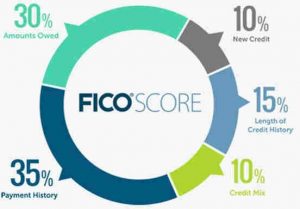
3 Key Areas Lenders review to determine if you are Mortgage Ready
#1 – CREDIT
This may seem obvious, but it’s not just the credit score – which, of course is a big consideration.
Lenders also consider how long a person has had credit.
Generally, 2-3 years of positive credit history is acceptable – especially after a Chapter 7 Bankruptcy (for FHA Loans). Conventional Loans may require a 4 year “seasoning” (waiting) period after a Chapter 7 Bankruptcy.
You may have a “good enough” credit score – some lenders will lend with a 580 credit score BUT but do you have:
Collections – what type of collections do you have, if any? Medical collections may be overlooked, but they still may be impacting your credit score. Other collections (based on amount and age) may need to be paid off or you may be asked to show proof that you are in a repayment plan.
Lenders will pull a credit report that shows your FICO score from all 3 bureaus (Experian, TransUnion and Equifax). They will disregard the highest score and the lowest score, and use the score that falls in the middle -otherwise referred to as the middle score.
If applying jointly for a loan, lenders will use the lowest middle score between the 2 borrowers.
Know your Middle FICO score before applying for a mortgage loan.
How do you improve your credit score? First understand what impacts a score. Take the time to read the article on the link below:

If you pay your bills on time, have no collections or public records, the quickest way to improve your score may be to pay down debt. Which leads us to the Next Key Item –
#2 – INCOME
Specifically, your Debt-To-Income Ratio (DTI).
Download a DTI Calculator here
To calculate your debt-to-income ratio:
Add up your minimum monthly debt payments that are on your credit report;
PLUS: any monthly child support payments, if any
PLUS: any monthly IRS payments, if any
PLUS: 1% of your total student loan debt, if you have payments that are in deferment.
Divide the total monthly debt payments by your Gross Monthly Income (income before any deductions have been taken out).
Ideally the resulting number should be less than 38%. However, some lenders will go as high as 50%.
What does this number mean? It indicates the amount of your gross
( before tax ) income that goes toward paying off debt.
If your DTI is too high, you mortgage application will be denied.
So even if you have perfect credit, the mortgage loan amount that you will be approved for, is also dependent on your income.
NOTE: It is strongly advised that you determine affordability for yourself, based on your NET income – the income that you actually bring home..
Use our Budgeting Template to determine affordability based on your living expenses and NET income.
Realize, as a homeowner, you may have more expenses than you have as a renter.
For example your utilities; electric, heat and water bills may be higher.
In addition, property maintenance and repairs are now your responsibility.
Which brings up the next Key Item:
#3 – SAVINGS
Even though there may be money available to assist with down payment and closing costs, you still need to have savings.
How Much? In our opinion at least $5,000.00 and more – for loans of $180,000.00 or less.
Why? To pay for:
Earnest money – money to take a home off the market and demonstrate to the seller that you are serious about purchasing a home ($1,000 – $2,500)
Down payment – FHA (Federal Housing Authority) loans require 3.5% of the purchase price as a down payment. So a $100,000.00 home will require down $3,500.00 payment.
Property Inspection – This is a MUST! – to determine the condition of the home.
This cost could run from $350.00 to $500.00 per inspection
Appraisal – required by the lender to determine if the property value is more than the loan amount. Some lenders will front this cost, some may not. This cost is also $350 – $500.00
Reserves – to show the lender when (not if) sh** life happens, you have savings to pay the mortgage. Lenders may ask you to demonstrate that you have 1 to 3 months of mortgage payments in a savings account.
Closing Costs* – the amount to bring with you at closing, in the form of a Certified Check.
Closings costs/fees can be are in the range of 2 to 5% of the purchase price.
So for a $100,000.00 home, the fees can range from $2,000 to $5,000.00.
Yes, if you qualify for assistance, the amount you may need at closing could be significantly reduced. However, to get to the closing table, you need to show that you have savings.



